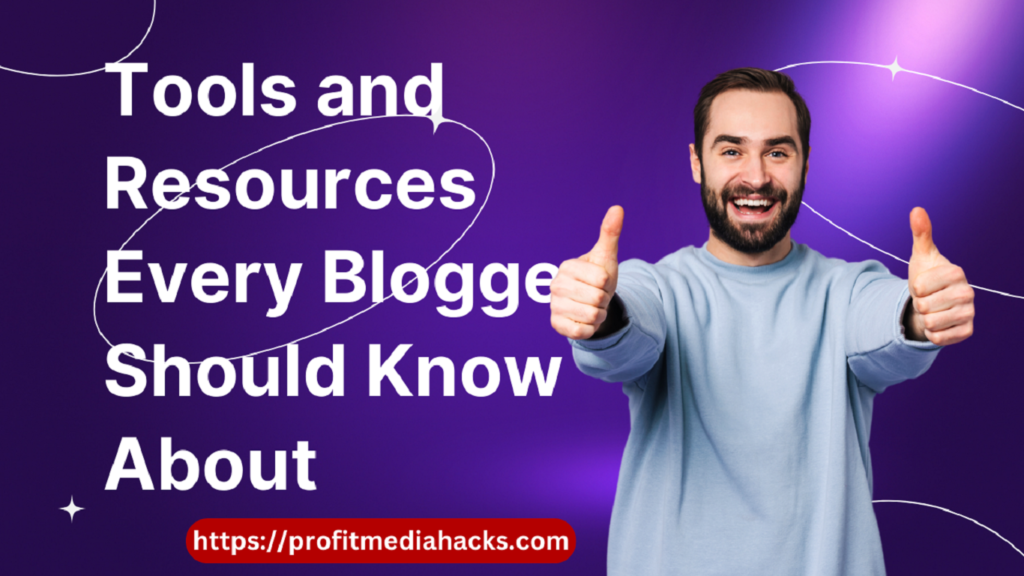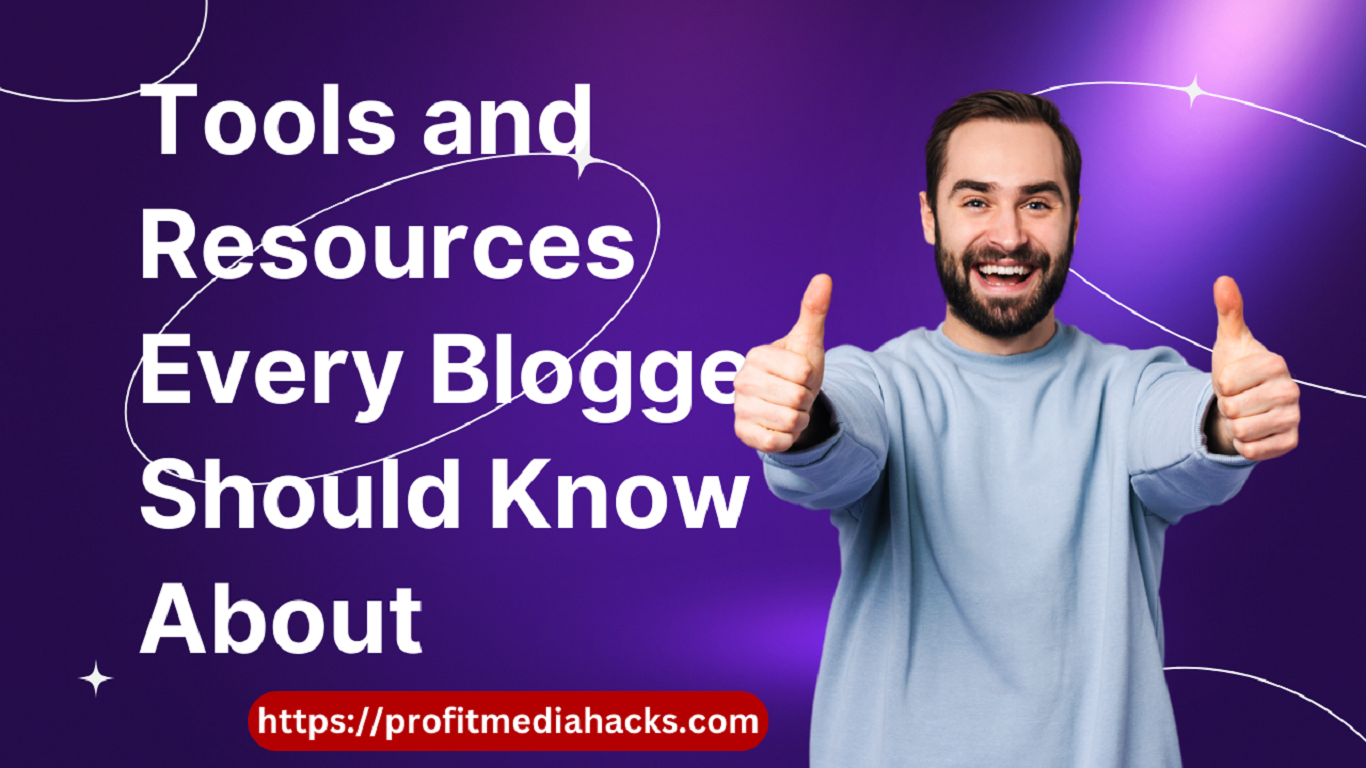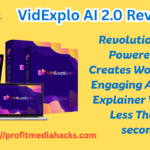Blogging has evolved into a dynamic and competitive field, demanding proficiency in various areas, from content creation to marketing and analytics. To navigate this landscape successfully, bloggers must leverage the right tools and resources. Whether you’re a novice or a seasoned blogger, understanding and utilizing these tools can significantly enhance your blog’s performance and streamline your workflow.
Easiest & Proven Way to Make $100 Daily with 0 COST – Watch THIS FREE Training to START >>

1. Content Management Systems (CMS):
Platforms like WordPress, Wix, and Squarespace offer user-friendly interfaces, customizable templates, and robust publishing capabilities, making them ideal choices for bloggers of all levels.
2. Search Engine Optimization (SEO) Tools:
Tools such as SEMrush, Ahrefs, and Google Keyword Planner enable bloggers to conduct keyword research, track website rankings, and optimize content for better search engine visibility, ultimately driving organic traffic to their blogs.
3. Content Creation and Editing Tools:
Software like Grammarly, Hemingway Editor, and Canva assist bloggers in crafting well-written, error-free content and creating visually appealing graphics, enhancing the overall quality and appeal of their blog posts.
4. Email Marketing Platforms:
Email marketing tools such as Mailchimp, ConvertKit, and Constant Contact enable bloggers to build and manage subscriber lists, create engaging newsletters, and implement targeted email campaigns, fostering stronger reader engagement and loyalty.
5. Analytics and Data Tracking Tools:
Google Analytics and similar tools offer valuable insights into website traffic, audience demographics, and user behavior, empowering bloggers to make informed decisions about content strategy, marketing efforts, and audience engagement.
6. Social Media Management Tools:
Platforms such as Hootsuite, Buffer, and Sprout Social simplify the process of scheduling, publishing, and monitoring social media content, allowing bloggers to maintain a consistent online presence and effectively engage with their followers across various platforms.
7. Monetization Platforms:
Tools like Google AdSense, affiliate marketing networks, and sponsored content marketplaces provide bloggers with opportunities to monetize their blogs through advertisements, partnerships, and sponsored posts, helping them generate revenue and sustain their blogging efforts.
Content Management Systems (CMS):
In the ever-evolving world of blogging, where content is king, an efficient and user-friendly Content Management System (CMS) stands as the foundation upon which bloggers build their digital empires. CMS platforms are the virtual hubs where ideas, creativity, and information seamlessly converge to create compelling blog posts. These systems offer bloggers a host of powerful features, simplifying the publishing process and enhancing the overall user experience.
Versatility and Customization: CMS platforms like WordPress provide bloggers with a wide array of themes and plugins, allowing for easy customization to suit their unique style and content. Whether you’re a fashion blogger looking for a sleek design or a tech guru craving a minimalist interface, CMS platforms cater to your needs.
User-Friendly Interfaces: CMS platforms are renowned for their intuitive, user-friendly interfaces. This accessibility is a boon for both beginners and seasoned bloggers, making content creation, editing, and publishing a breeze.
SEO Optimization: Many CMS platforms come equipped with built-in SEO features or plugins, enabling bloggers to optimize their content for search engines. This is a game-changer for bloggers seeking increased visibility and organic traffic.
Content Scheduling: Scheduling posts for future publication is another invaluable feature offered by CMS platforms. This means bloggers can maintain a consistent posting schedule without being tied to their screens 24/7.
Mobile Responsiveness: With the increasing prevalence of mobile devices, a CMS that ensures mobile responsiveness is a must. Most modern CMS platforms prioritize mobile-friendly designs, ensuring that your blog looks great on any screen.
Incorporating the right CMS into your blogging strategy can significantly streamline your content creation process, enhance your blog’s aesthetics, and optimize your website for a broader audience. Whether you’re a newbie blogger or an experienced wordsmith, having a reliable CMS at your disposal is the cornerstone of a successful blogging journey.
Search Engine Optimization (SEO) Tools:
In the competitive realm of online content, mastering the art of Search Engine Optimization (SEO) is paramount for bloggers striving to elevate their digital presence. With the aid of specialized SEO tools, bloggers can unravel the intricacies of search engine algorithms and strategically position their content to garner higher visibility and organic traffic. These tools serve as indispensable allies, offering valuable insights and actionable data that empower bloggers to optimize their web content and stay ahead of the ever-evolving SEO landscape.
Keyword Research and Analysis: SEO tools like SEMrush and Ahrefs facilitate comprehensive keyword research, empowering bloggers to identify high-impact keywords and phrases that align with their niche and resonate with their target audience.
Competitor Analysis: These tools also allow for insightful competitor analysis, enabling bloggers to gain a better understanding of their competitors’ strategies, identify gaps in the market, and capitalize on untapped opportunities.
On-Page Optimization Guidance: Many SEO tools provide on-page optimization recommendations, guiding bloggers on crucial elements such as meta tags, headings, and content structure to ensure their web pages are optimized for maximum search engine visibility.
Easiest & Proven Way to Make $100 Daily with 0 COST – Watch THIS FREE Training to START >>
Backlink Analysis and Management: Through backlink analysis features, SEO tools assist bloggers in evaluating the quality and quantity of backlinks directed to their site, helping them build a robust backlink profile and improve their website’s authority in the eyes of search engines.
Performance Tracking and Reporting: These tools offer comprehensive performance tracking and reporting functionalities, allowing bloggers to monitor their website’s SEO metrics, identify areas for improvement, and track the impact of their SEO efforts over time.
By harnessing the power of SEO tools, bloggers can refine their content strategies, enhance their website’s search engine rankings, and ultimately increase their online visibility and engagement. Staying abreast of the latest SEO tool developments is a fundamental step for bloggers looking to establish a strong and enduring digital footprint.
Content Creation and Editing Tools:
The art of crafting captivating and error-free content lies at the heart of successful blogging. In this digital age, where attention spans are fleeting, leveraging advanced content creation and editing tools has become essential for bloggers aiming to deliver polished and engaging content that resonates with their audience. These tools serve as virtual writing assistants, offering a range of features that streamline the content creation process, enhance readability, and ensure that every piece of content published is of the highest caliber.
Grammar and Spelling Checks: Tools like Grammarly and Hemingway Editor provide real-time grammar and spelling checks, enabling bloggers to eliminate errors and ensure that their content is grammatically sound and polished.
Plagiarism Checkers: Plagiarism checkers such as Copyscape and Quetext help bloggers verify the originality of their content, ensuring that their work is authentic and free from any instances of plagiarism.
Readability Enhancements: These tools offer readability enhancement suggestions, aiding bloggers in improving the flow and coherence of their writing, thereby enhancing the overall readability and comprehension of their content.
Visual Content Creation: Platforms like Canva and Adobe Spark empower bloggers to create visually appealing graphics, infographics, and other multimedia elements that complement their written content and enhance its visual appeal.
Content Organization and Collaboration: Tools like Google Docs and Microsoft Word facilitate seamless content organization and collaboration, allowing bloggers to streamline their writing process, collaborate with team members, and ensure a smooth workflow from initial draft to final publication.
By integrating these content creation and editing tools into their workflow, bloggers can elevate the quality of their content, foster a stronger connection with their readers, and establish themselves as authorities in their respective niches. A commitment to leveraging these tools is a testament to a blogger’s dedication to delivering top-notch, engaging, and impactful content to their audience.
Email Marketing Platforms:
In the bustling digital landscape, where building and maintaining meaningful connections with readers is pivotal, leveraging robust Email Marketing Platforms has emerged as a cornerstone of successful blogging. These platforms serve as powerful conduits, enabling bloggers to cultivate and nurture their audience through targeted and personalized email campaigns. By harnessing the capabilities of these platforms, bloggers can establish a direct line of communication with their subscribers, deliver valuable content directly to their inboxes, and foster lasting relationships that transcend the limitations of traditional online engagement.
Subscriber List Management: Email marketing platforms such as Mailchimp and ConvertKit provide efficient subscriber list management tools, allowing bloggers to organize, segment, and maintain their subscriber base for more targeted and personalized communication.
Newsletter Creation and Design: These platforms offer user-friendly interfaces for designing visually appealing newsletters, enabling bloggers to create engaging and informative email content that resonates with their subscribers and drives increased reader engagement.
Automated Email Campaigns: Email marketing platforms facilitate the creation of automated email campaigns, empowering bloggers to deliver timely and relevant content to their subscribers based on predefined triggers, such as subscription, engagement, or specific actions on the blog.
Performance Tracking and Analytics: These platforms provide comprehensive performance tracking and analytics features, allowing bloggers to monitor the success of their email campaigns, track key metrics such as open rates and click-through rates, and make data-driven decisions to optimize their email marketing strategies.
Personalization and Targeting Capabilities: With advanced personalization and targeting capabilities, email marketing platforms enable bloggers to deliver highly tailored and relevant content to specific segments of their subscriber base, fostering stronger reader engagement and driving higher conversion rates.
By harnessing the power of email marketing platforms, bloggers can establish a direct and effective channel for communicating with their audience, cultivating brand loyalty, and driving valuable engagement that extends beyond the confines of their blog. Integrating these platforms into their marketing strategy underscores a blogger’s commitment to fostering meaningful connections and delivering value-driven content to their subscribers.
Analytics and Data Tracking Tools:
In the data-driven landscape of digital content creation, the integration of robust Analytics and Data Tracking Tools has become indispensable for bloggers seeking to understand and optimize their online presence. These tools serve as virtual compasses, offering valuable insights and comprehensive data that allow bloggers to gain a deeper understanding of their audience’s preferences, behavior, and interactions with their content. By harnessing the power of these tools, bloggers can make informed decisions, refine their content strategy, and tailor their online offerings to better resonate with their target audience, ultimately fostering stronger reader engagement and driving sustainable growth.
Easiest & Proven Way to Make $100 Daily with 0 COST – Watch THIS FREE Training to START >>
Website Traffic Analysis: Tools like Google Analytics and Piwik provide in-depth analysis of website traffic, enabling bloggers to gain insights into visitor demographics, behavior flow, and popular content, helping them refine their content strategy and enhance user engagement.
Audience Demographics and Behavior: These tools offer detailed audience demographic and behavior insights, allowing bloggers to understand their readers’ preferences, interests, and online behavior, which can inform content creation and marketing strategies tailored to their target audience.
Conversion Tracking: Analytics and data tracking tools facilitate conversion tracking, enabling bloggers to monitor and analyze conversion rates, identify high-performing content, and optimize their website for improved lead generation and sales.
Performance Benchmarking: These tools provide performance benchmarking metrics, allowing bloggers to compare their website’s performance against industry standards and competitors, helping them set realistic goals and benchmarks for continuous improvement.
Custom Reporting and Insights: With customizable reporting features, bloggers can generate tailored reports that highlight key metrics and insights specific to their blogging objectives, facilitating data-driven decision-making and the implementation of targeted strategies for sustainable growth.
By leveraging the capabilities of analytics and data tracking tools, bloggers can unlock the power of data-driven insights, optimize their content strategy, and cultivate a dynamic online presence that resonates with their audience. A commitment to data-driven decision-making underscores a blogger’s dedication to continuous improvement and the delivery of valuable, relevant, and engaging content to their readers.
Social Media Management Tools:
In the bustling realm of digital communication, where maintaining a robust social media presence is key to expanding one’s online reach, Social Media Management Tools have emerged as indispensable assets for bloggers. These tools serve as command centers, offering a comprehensive suite of functionalities that streamline social media content creation, scheduling, and analysis. By harnessing the capabilities of these tools, bloggers can effectively manage their social media platforms, engage with their audience in real-time, and cultivate a vibrant online community that amplifies the visibility and impact of their blog content.
Content Scheduling and Publishing: Social media management tools such as Hootsuite and Buffer enable bloggers to schedule and publish social media content across multiple platforms, ensuring a consistent and strategic online presence.
Audience Engagement and Monitoring: These tools facilitate real-time audience engagement and monitoring, allowing bloggers to promptly respond to comments, messages, and mentions, fostering a sense of community and building stronger relationships with their followers.
Performance Analytics and Reporting: Social media management tools provide comprehensive performance analytics and reporting features, enabling bloggers to track key metrics such as engagement rates, follower growth, and content reach, which can inform data-driven decision-making and content strategy optimization.
Competitor Analysis and Insights: These tools offer competitor analysis and insights, allowing bloggers to gain a better understanding of their competitors’ social media strategies, identify industry trends, and capitalize on opportunities to differentiate and strengthen their own online presence.
Campaign Management and Integration: With campaign management and integration capabilities, social media management tools empower bloggers to launch and monitor targeted social media campaigns, ensuring seamless integration with their overall marketing strategy and maximizing the impact of their online promotions.
By leveraging the capabilities of social media management tools, bloggers can elevate their social media presence, foster meaningful engagement with their audience, and amplify the visibility and impact of their blog content across various digital platforms. Embracing these tools underscores a blogger’s commitment to cultivating a dynamic online community and establishing a strong and enduring digital footprint.
Monetization Platforms:
In the dynamic landscape of online content creation, the integration of robust Monetization Platforms has become a fundamental strategy for bloggers seeking to sustain their blogging endeavors and generate revenue from their digital content. These platforms serve as virtual marketplaces, offering bloggers a diverse range of monetization opportunities, from advertisements to affiliate marketing and sponsored content. By leveraging the capabilities of these platforms, bloggers can unlock new streams of income, capitalize on their online influence, and transform their passion for blogging into a viable and sustainable source of income.
Google AdSense and Display Advertising: Monetization platforms like Google AdSense enable bloggers to earn revenue through display advertising, allowing them to display targeted ads on their blogs and earn income based on ad clicks or impressions.
Affiliate Marketing Networks: These platforms facilitate affiliate marketing partnerships, enabling bloggers to promote products or services relevant to their niche and earn a commission for each sale or lead generated through their affiliate links.
Sponsored Content Marketplaces: Monetization platforms offer access to sponsored content marketplaces, connecting bloggers with brands and businesses seeking to collaborate on sponsored posts, reviews, or promotional content, providing bloggers with opportunities to earn income through sponsored collaborations.
Subscription-Based Models: Some platforms support subscription-based models, allowing bloggers to offer premium content, exclusive resources, or ad-free experiences to subscribers in exchange for a recurring subscription fee, providing a steady and predictable source of income.
E-commerce Integration: Monetization platforms facilitate e-commerce integration, enabling bloggers to sell digital products, merchandise, or services directly through their blogs, expanding their revenue streams and providing their audience with valuable offerings that align with their niche and expertise.
By leveraging the capabilities of monetization platforms, bloggers can diversify their revenue streams, maximize their earning potential, and transform their passion for blogging into a sustainable and lucrative online business. Embracing these platforms underscores a blogger’s entrepreneurial spirit and commitment to nurturing a thriving online presence that not only resonates with their audience but also generates tangible financial returns.
Conclusion
The world of blogging demands a multifaceted approach, and leveraging the right tools and resources is essential for success. By incorporating these essential tools into their blogging strategy, bloggers can optimize their content, expand their reach, and maximize their earning potential. Staying informed about the latest tools and trends in the blogging industry is crucial for maintaining a competitive edge and achieving long-term blogging success.
Easiest & Proven Way to Make $100 Daily with 0 COST – Watch THIS FREE Training to START >>
Thank you so much for taking the time to read my article, ”Tools and Resources Every Blogger Should Know About” Stay Safe!!!!













